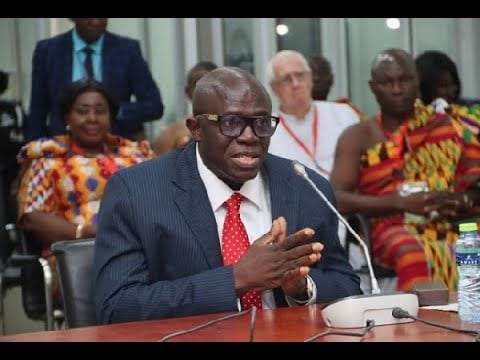 Sir Dennis Dominic Adjei,
Sir Dennis Dominic Adjei,Justice Sir Dennis Dominic Adjei, a nominee to the Supreme Court, says the country’s laws must grant discretion to judges to impose alternative sentences in capital punishment cases, instead of the mandatory death penalty prescribed by law.
He mentioned offences such as treason, high treason, and certain provisions of the Armed Forces Act (Act 105), which currently prescribe the death penalty upon conviction.
“I agree that the mandatory imposition of the death sentence is wrong. If a person goes to court and is to be convicted for capital penalty, first and foremost, we must respect life. The judge who heard the matter should have the discretion either to give several years or impose the death sentence,” he opined.
Justice Sir Dennis Adjei, a nominee to the Supreme Court, made the remarks during his vetting by Parliament’s Appointments Committee on Monday, June 16.
He was of the conviction that the automatic imposition of the death penalty violated the fundamental right to life and placed Ghana in breach of its international human rights commitments.
Ghana is a signatory to the African Charter, and Article 4 provides that you must respect life.
Justice Sir Adjei observed that the rigid approach in the country’s laws undermined her obligations under Article 4 of the African Charter on Human and Peoples’ Rights, which upholds the sanctity of life.
“The African Court has variously held that any decision by any country that does not give a judge discretion in the imposition of the death sentence is in violation of Article 4,” he noted.
Taking inspiration from his tenure at the African Court on Human and Peoples’ Rights, Justice Sir Adjei cited landmark rulings against countries such as Tanzania and Benin, where mandatory death penalties were declared were in violation of human rights law.
The Supreme Court nominee noted that Ghana could face similar legal setbacks if reforms are not implemented.
“If cases from Ghana happen to go before the court, we are going to face the same fate. We are going to lose,” he stated.
On issue of child marriage and witchcraft, Justice Sir Adjei said the accusation of witchcraft was an outmoded culture and should not be entertained, noting that, it was only Tanzania, which had witchcraft ascribed in their laws, which the African Human Rights Court condemned.
He noted that there was a constitutional gap in Ghana’s laws concerning the issue of “marriage and sex” and must be addressed.
He observed that the country’s laws stipulated that a person could have sex at age 16, but can only marry at age 18, describing this scenario as a gap that must be resolved.
“So, if you’re of 16, that means the person is 16 and the person voluntarily have sex, you can’t blame any of the parties involved in the act, but that person can’t marry until she or he is 18 years,” he said.
“What happens within the period before 18, there is a gap between our laws, and I believe in the future we can fill the gap…So, why don’t we make it straightforward that you can marry and have sex at age 18?” He queried.
“Why can’t we wait for the child to get education or learn a trade so that in the future if there is dissolution of the marriage the child can survive,” he stated.


